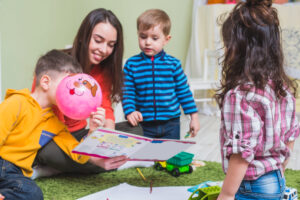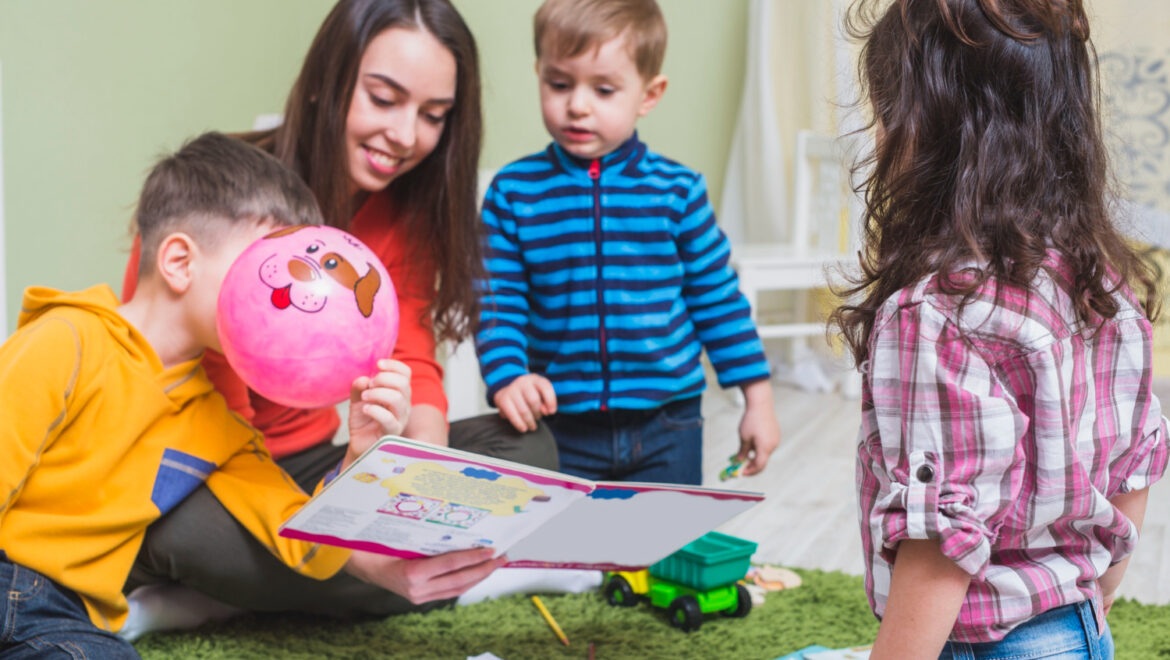Imagine your child entering a colorful world full of laughter, joy, and endless chances to grow. Preschool, is the place where early childhood education starts. It is a magical place where young minds thrive, is crucial in shaping your child’s learning and discovery journey. Enrolling in preschool offers many benefits that build a strong foundation for future success. This blog will discuss the importance of preschool for your child’s development and highlight seven key benefits of preschool education.
Picture your child happily engaged in a group activity, proudly showing their artwork to new friends. Preschool focuses on social and emotional growth. Through play and interactive sessions, children learn important social skills like sharing, taking turns, and cooperating with others. They form lasting friendships and develop emotional intelligence, learning to understand and express their feelings in a supportive setting.
Know why early childhood education is important and its role in a child’s overall development.
-
Preschool is an Opportunity for Growth-
Preschool is a child’s first experience with teachers and groups of children, where they learn to share, follow instructions, ask questions, take turns, and seek teachers’ attention. Preschool learning lays the foundation that will support them throughout their school life.
-
Promotes Language Skills-
Your child’s cooing and babbling are now turning into words and meaningful sentences. A preschool’s language-rich environment helps by introducing new vocabulary and asking thought-provoking questions. Preschoolers learn to speak effectively through exploring new things, reading books, acting out stories, singing, and communicating with peers and teachers.
-
Early childhood education enhances Cognitive Skills-
The preschool curriculum includes activities that encourage children to try new things, solve problems, ask questions, and observe the world around them. These activities enhance their cognitive skills, enabling them to learn more effectively.
-
Social and Emotional Development-
Preschool introduces children to socializing with peers while learning important social skills. Through play and group activities, children form social bonds, learn to share, take turns, and cooperate with others. They also develop emotional intelligence by understanding and expressing their feelings in a supportive environment. Early experiences with others help children prepare for school and build lasting relationships in their lives.
-
Creativity and Curiosity-

Young children are naturally curious, love to ask questions, and enjoy exploring their surroundings. They also have creative ideas and vivid imaginations. Preschool activities like beading, arts and crafts, field trips, and free play help nurture their creativity.
6. The Role of Parents in Early Childhood education-
As a parent, your involvement in your child’s preschool education is essential. While preschool offers a rich learning environment, your support and participation enhance their experience even more. By actively engaging in your child’s preschool journey, you can strengthen their development and build a closer bond with them.
7. Preschool Nurtures a Child’s Curiosity-
Young children have active imaginations and a constant curiosity that fuels their learning and creativity. The preschool environment encourages exploration. As kids observe their surroundings, they ask questions that help them become eager learners. A stimulating environment and proper adult interactions boost their creativity and curiosity.
8. Preschool Helps Children Foster Themselves-
In preschool, children learn to grow by taking care of themselves and others. Teachers show them how to wash their hands, keep their belongings in their bags, and put toys back in their places. This teaches responsibility and helps them understand their self-worth.
9. Preschool boosts Motor Skills-
Developing fine and gross motor skills is crucial for children as these skills help them in various activities throughout their lives. Preschool activities like lacing, reading, cutting, sticking, throwing, painting, running, and outdoor play encourage the development of these skills. These activities give children the chance to challenge themselves and improve their abilities.
10. Pre-literacy Skills learnt in Early Childhood education –
In preschool, teachers use various games and activities to develop pre-literacy skills. Rhymes help children distinguish different sounds, and stories teach fundamental life skills in a fun way. Introducing alphabets, words, and numbers lays the groundwork for language and math skills. This approach helps children develop a joy and motivation for learning new things.
The Final Word
Providing a quality preschool education is one of the best gifts you can give your child. Choose the best preschool carefully, ensuring it meets your child’s needs like- Cambridge Kinderland does.


Add Comment